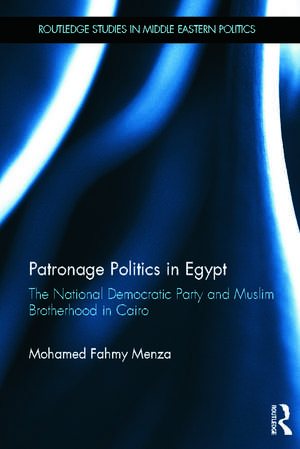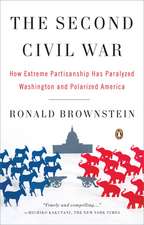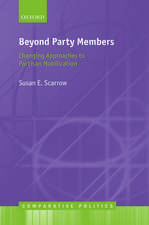Patronage Politics in Egypt: The National Democratic Party and Muslim Brotherhood in Cairo: Routledge Studies in Middle Eastern Politics
Autor Mohamed Fahmy Menzaen Limba Engleză Hardback – 30 noi 2012
Throughout the post-1952 era, political patrons and respective clients were influential in Egyptian politics, shaping the policies implemented by Egypt's rulers, as well as the tactics orchestrated by the wider population. On a macro level Patronage Politics in Egypt examines the activities of the NDP (ruling party from 1978-2011) and its opposition, the Muslim Brotherhood. On a micro level, the book uses the area of Misr Al Qadima as a case study to examine the factors that ensured the durability of patronage networks within the Egyptian polity.
By examining how the local links into macro-level politics, this book portrays the socio-economic and political contexts that set the stage for the January 25 Revolution. This topical study will be an invaluable resource for students, scholars and researchers of the Middle East and Islam as well as those with a more general interest in politics.
| Toate formatele și edițiile | Preț | Express |
|---|---|---|
| Paperback (1) | 299.52 lei 6-8 săpt. | |
| Taylor & Francis – 31 mai 2017 | 299.52 lei 6-8 săpt. | |
| Hardback (1) | 821.29 lei 6-8 săpt. | |
| Taylor & Francis – 30 noi 2012 | 821.29 lei 6-8 săpt. |
Din seria Routledge Studies in Middle Eastern Politics
-
 Preț: 311.41 lei
Preț: 311.41 lei -
 Preț: 280.08 lei
Preț: 280.08 lei -
 Preț: 309.89 lei
Preț: 309.89 lei -
 Preț: 302.13 lei
Preț: 302.13 lei - 9%
 Preț: 1004.93 lei
Preț: 1004.93 lei - 18%
 Preț: 1065.06 lei
Preț: 1065.06 lei - 18%
 Preț: 1170.14 lei
Preț: 1170.14 lei - 12%
 Preț: 300.49 lei
Preț: 300.49 lei - 18%
 Preț: 1057.57 lei
Preț: 1057.57 lei - 14%
 Preț: 299.06 lei
Preț: 299.06 lei - 18%
 Preț: 1162.08 lei
Preț: 1162.08 lei - 28%
 Preț: 850.37 lei
Preț: 850.37 lei - 18%
 Preț: 1066.09 lei
Preț: 1066.09 lei - 18%
 Preț: 1057.05 lei
Preț: 1057.05 lei - 18%
 Preț: 1059.48 lei
Preț: 1059.48 lei - 18%
 Preț: 1166.49 lei
Preț: 1166.49 lei - 18%
 Preț: 1062.31 lei
Preț: 1062.31 lei - 25%
 Preț: 854.33 lei
Preț: 854.33 lei -
 Preț: 418.22 lei
Preț: 418.22 lei -
 Preț: 341.20 lei
Preț: 341.20 lei -
 Preț: 409.69 lei
Preț: 409.69 lei - 18%
 Preț: 1061.06 lei
Preț: 1061.06 lei - 18%
 Preț: 1056.00 lei
Preț: 1056.00 lei -
 Preț: 287.99 lei
Preț: 287.99 lei - 18%
 Preț: 1057.57 lei
Preț: 1057.57 lei - 18%
 Preț: 1001.87 lei
Preț: 1001.87 lei - 18%
 Preț: 1055.84 lei
Preț: 1055.84 lei - 18%
 Preț: 1052.38 lei
Preț: 1052.38 lei - 18%
 Preț: 1057.89 lei
Preț: 1057.89 lei - 26%
 Preț: 822.36 lei
Preț: 822.36 lei - 18%
 Preț: 1057.26 lei
Preț: 1057.26 lei - 18%
 Preț: 1439.85 lei
Preț: 1439.85 lei - 18%
 Preț: 1164.92 lei
Preț: 1164.92 lei - 18%
 Preț: 1057.75 lei
Preț: 1057.75 lei - 18%
 Preț: 1058.79 lei
Preț: 1058.79 lei - 18%
 Preț: 1057.75 lei
Preț: 1057.75 lei - 18%
 Preț: 1056.32 lei
Preț: 1056.32 lei - 18%
 Preț: 1055.69 lei
Preț: 1055.69 lei - 25%
 Preț: 824.70 lei
Preț: 824.70 lei - 18%
 Preț: 1060.25 lei
Preț: 1060.25 lei - 18%
 Preț: 1060.87 lei
Preț: 1060.87 lei - 18%
 Preț: 1071.30 lei
Preț: 1071.30 lei - 26%
 Preț: 820.03 lei
Preț: 820.03 lei - 18%
 Preț: 1056.35 lei
Preț: 1056.35 lei - 18%
 Preț: 1061.22 lei
Preț: 1061.22 lei
Preț: 821.29 lei
Preț vechi: 1103.57 lei
-26% Nou
Puncte Express: 1232
Preț estimativ în valută:
157.15€ • 164.08$ • 130.06£
157.15€ • 164.08$ • 130.06£
Carte tipărită la comandă
Livrare economică 04-18 aprilie
Preluare comenzi: 021 569.72.76
Specificații
ISBN-13: 9780415686235
ISBN-10: 0415686237
Pagini: 200
Ilustrații: 15 tables, 11 halftones and 2 line drawings
Dimensiuni: 156 x 234 x 17 mm
Greutate: 0.53 kg
Ediția:New.
Editura: Taylor & Francis
Colecția Routledge
Seria Routledge Studies in Middle Eastern Politics
Locul publicării:Oxford, United Kingdom
ISBN-10: 0415686237
Pagini: 200
Ilustrații: 15 tables, 11 halftones and 2 line drawings
Dimensiuni: 156 x 234 x 17 mm
Greutate: 0.53 kg
Ediția:New.
Editura: Taylor & Francis
Colecția Routledge
Seria Routledge Studies in Middle Eastern Politics
Locul publicării:Oxford, United Kingdom
Public țintă
Postgraduate and UndergraduateCuprins
1. Introduction 2. Who are the Lesser Notables? Historical Background and Modes of Production and Circulation, Affiliations and Political Roles 3. Misr Al Qadima: The Popular Quarter and the Politiy of the Lesser Notable 4. The Muslim Brotherhood, the Jamm’eya Al Shar’eyya and Networks of Support in Misr Al Qadima: The Role of the Lesser Notables 5. The Dissolved National Democratic Party-affiliated Lesser Notability in Misr al Qadima 6. Conclusions: Reflections on the sociopolitical agency and the Prospective Role of Lesser Notabilities in the Egyptian Polity
Notă biografică
Dr. Mohamed I. Fahmy Menza earned his PhD in Arab & Islamic Studies, specializing in political economy and sociology, from the Institute of Arab and Islamic Studies at Exeter University. He has previously taught courses in political economy and development at Exeter University and the American University in Cairo (AUC) and currently teaches Arab and Global South Dialogue at the Core Curriculum, AUC. His research interests lie within the field of Middle East politics and society in general, with a special focus on state/society relations, informal and patronage politics and the political economy of development.
Descriere
Between the military takeover of 1952 and the collapse of the Mubarak regime in 2011, the political system of Egypt depended upon a variety of mechanisms and structures to establish and consolidate its powerbase. Among those, an intricate web of what could be described as ‘patronage politics’ emerged as one of the main foundations of these tools.
Throughout the post-1952 era, political patrons and respective clients were influential in Egyptian politics, shaping the policies implemented by Egypt's rulers, as well as the tactics orchestrated by the wider population. On a macro level Patronage Politics in Egypt examines the activities of the NDP (ruling party from 1978-2011) and its opposition, the Muslim Brotherhood. On a micro level, the book uses the area of Misr Al Qadima as a case study to examine the factors that ensured the durability of patronage networks within the Egyptian polity.
By examining how the local links into macro-level politics, this book portrays the socio-economic and political contexts that set the stage for the January 25 Revolution. This topical study will be an invaluable resource for students, scholars and researchers of the Middle East and Islam as well as those with a more general interest in politics.
Throughout the post-1952 era, political patrons and respective clients were influential in Egyptian politics, shaping the policies implemented by Egypt's rulers, as well as the tactics orchestrated by the wider population. On a macro level Patronage Politics in Egypt examines the activities of the NDP (ruling party from 1978-2011) and its opposition, the Muslim Brotherhood. On a micro level, the book uses the area of Misr Al Qadima as a case study to examine the factors that ensured the durability of patronage networks within the Egyptian polity.
By examining how the local links into macro-level politics, this book portrays the socio-economic and political contexts that set the stage for the January 25 Revolution. This topical study will be an invaluable resource for students, scholars and researchers of the Middle East and Islam as well as those with a more general interest in politics.

















